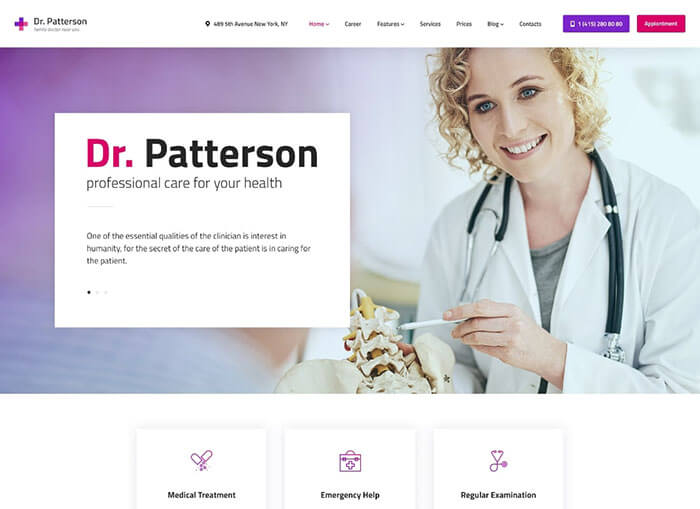In essence, today’s healthcare is all about convenience and flexibility. As the healthcare revolution shifts care norms, a patient-centric framework becomes crucial. It is indispensable for enhancing patient experiences and streamlining communication.
Medical portals are the crux of patient-centric care. These days, healthcare professionals rely on custom medical portals to ensure personalized care delivery. WordPress, a robust and flexible platform, enables healthcare systems like EHRs and EMRs to build feature-rich medical portals that cater to the unique needs of both patients and providers.
This article will provide details about how WordPress portal designs impact patient and provider experiences. Shall we begin?
WordPress as a Foundation for Healthcare Portals
WordPress is a comprehensive platform that supports the dynamic requirements of the healthcare sector. It is more than just a content management system. It allows healthcare solutions to create portals that centralize key functions like appointment scheduling, patient data access, and billing systems—all while ensuring compliance with healthcare regulations.
Custom portals not only boost patient engagement by putting them in control of their health but also greatly simplify administrative tasks for care providers. WordPress’s built-in plug-ins and self-service features are the prime reason why it lays the foundation of meaningful portals.
WordPress Plugins for Building Medical Portals
WordPress encompasses a vast library of plugins to improve the functionality of healthcare portals. These plugins extend WordPress’s capabilities to meet customer needs, enabling a smooth, appointment scheduling to patient records. This is exactly what the best EMR and medical billing software solutions offer—seamless integration and enhanced administrative efficiency within a WordPress-powered system.
Patient Report Management: Streamlines report sharing on the portals with restricted access to authorized users.
Telemedicine Plugin: Enables virtual patient consultations directly through the portal.
WP Health Records: Allows patients and providers to securely access and manage records.
Booking Calendar: Facilitates scheduling appointments in real time.
KiviCare: Offers comprehensive patient management features to improve patient satisfaction.
WP Customer Area: Enables providers to create private patient spaces to view data securely.
Formidable Forms: Ensures forms are HIPAA compliant and data is encrypted and stored securely.
With all these plug-ins, WordPress simplifies the creation of custom medical portals, which are the need of the hour. Leveraging these plug-ins, the best EMR for small practices improves patient engagement and reduces manual workload, streamlining clinical workflows.
Core Benefits for Medical Portals: Shaping Care Journey
Enhancing Patient Experiences
WordPress-powered patient portals encompass an array of advantages, improving care journeys. From automated appointment scheduling to online payments and seamless communication, WordPress plugins support it all. Let’s explore the salient elements of how custom medical portals streamline patient experiences by leveraging WordPress plugins.
Ways WordPress-EMR Integration Enhances Patient Engagement:
24/7 Access: Healthcare solutions offer patient portals where clients can access medical records, schedule appointments, pay bills, or communicate with their physicians. WordPress plugins like KiviCare add to patient engagement by enabling them to manage their profiles, upload lab records, etc.
Streamlined Communication: WordPress-powered patient portals enable secure messaging, allowing patients to contact their doctors directly and reducing unnecessary in-person visits. For instance, Telemedicine WP ensures secure and convenient virtual interactions between patients and providers, improving care delivery.
Appointment Scheduling: Patients can easily book appointments online using medical portals, reducing wait times and the need for phone calls. WP Simple Booking Calendar is a noteworthy plugin that simplifies appointment scheduling. Healthcare systems can sync it with their existing scheduling tools for better outcomes.
Improving Workflow For Providers
Healthcare portals surely enhance clinical efficiency by optimizing workflow and lessening physicians’ burdens, keeping them focused on care delivery. Here’s how WordPress assists healthcare solutions in customizing provider experiences by integrating effective plugins with EMRs.
Efficiency Gains with WordPress-EMR Integration:
Automated Appointment Reminders: WordPress embeds appointment management plugins in provider portals, allowing them to view appointment calendars and send automated reminders to patients with enhanced accuracy and precision. Top-rated appointment plugins are Bookly and Booknetic.
Efficient Data Management: Centralized access to patient data helps providers manage medical records, track treatment plans, and ensure compliance with healthcare standards. They can also update patients in real time, building trust and credibility.
Real-time Patient Data Access: WP MedicalRecords is a prominent plugin that powers healthcare professionals by providing them with real-time patient health metrics. It records data by integrating it with the patient’s wearable health gadgets and uploading it to EMR records.
Online Billing: Medical portals support online billing, which relaxes patients and providers by reducing the workload on administrative staff. It shifts the staff’s focus to patient care. Also, plugins like Paymattic sync billing details with the EMR systems to enhance transparency.
Telemedicine Integration: WordPress can integrate telehealth services within the portals, allowing care professionals to offer remote consultations and expand their reach. KeviCare is the most comprehensive plugin for remote patient care management.
Security and Compliance in WordPress Medical Portals
Customizable portals are essential to catering to personalized patient needs; ensuring security and seamless patient experiences is paramount. When combined with the right plugins and configurations, WordPress ensures that medical portals meet stringent data protection standards.
WordPress promises compliance by featuring customizable portals that safeguard patient data and promise adherence to healthcare regulations. Leveraging top-notch security protocols like SSL certificates and encryption plugins ensures critical data is transmitted securely between patients and providers.
Above all, WordPress supports medical portals by providing role-based access. This way, only authorized personnel gain access to confidential patient data, helping healthcare solutions meet security requirements. The best mental health EMR TheraNest leverages WordPress plugins to elevate security on its medical portals and meet compliance requirements.
Thanks to WordPress, TheraNest garners the reputation of a top-notch patient care service provider and is highly appreciated by care providers for its intuitive medical portals. Similarly, many more healthcare systems rely on WP plugins to improve patient satisfaction by ensuring data confidentiality while being compliant.
Additional Considerations: Advantages of Using WordPress for Medical Portals
WordPress provides healthcare providers with a cost-effective, scalable, and easily manageable solution for building portals that meet their operational needs while offering a user-friendly experience for patients. Some of the unique benefits of using WordPress for healthcare portals include:
SEO Optimization: WordPress offers SEO tools to ensure medical portals rank well on search engines, making it easier for patients to find their providers online.
Customization: Healthcare organizations can customize the look and functionality of their portals to improve the user experience.
Multilingual Functionality: WordPress supports multilingual functionality, enabling providers to expand their patient outreach.
Theme Selection: EMR solutions can use WordPress themes to create visually appealing, responsive, and compatible portals that reflect their brand.
Conclusion
Convenience is the key to patient and provider satisfaction. WordPress-powered medical portals are laced with intuitive specs that enhance patient care administrative processes and ensure secure data management. The extensive plug-ins of this platform help build user-friendly portals where clients can easily access crucial information. This builds a sense of control among the patients and relieves the physicians’ stress. Beyond convenience, custom medical portals by WordPress streamline communication, establishing strong patient-physician bonds. Its seamless data accessibility enhances personalized care and boosts patient satisfaction.
WordPress will remain at the forefront as healthcare continues to evolve. It will help healthcare organizations deliver better patient experiences with high-quality care and improve operational efficiency.



